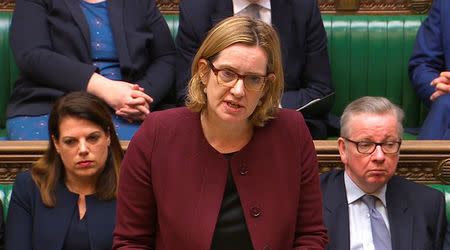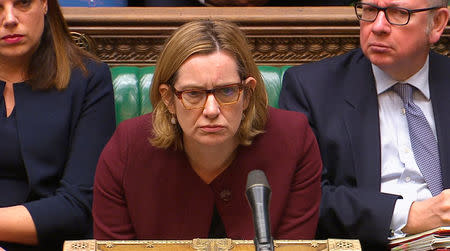Rudd refuses to quit over immigrants' treatment
LONDON (Reuters) - British interior minister Amber Rudd said she had no plans to resign after giving contradictory statements about meeting targets for deportations, deepening a scandal over Britain's treatment of Caribbean immigrants.
For nearly two weeks, British ministers have been struggling to explain why some descendants of the so-called "Windrush generation", invited to Britain to plug labour shortfalls between 1948 and 1971, had been labelled as illegal immigrants.
The Windrush scandal overshadowed the Commonwealth summit last week in London and has raised questions about Theresa May's six-year stint as interior minister before she became prime minister in the wake of the 2016 Brexit referendum.
May apologised to the black community on Thursday in a letter to The Voice, Britain's national Afro-Caribbean newspaper.
"We have let you down and I am deeply sorry," she said. "But apologies alone are not good enough. We must urgently right this historic wrong."
Rudd said at a lunch with reporters in parliament that it had been "a difficult few weeks", but she was committed to the Home Office.
She told lawmakers on Wednesday that Britain did not have targets for the removal of immigrants, but on Thursday was forced to clarify her words after leaked documents showed some targets did exist.
"I have never agreed that there should be specific removal targets and I would never support a policy that puts targets ahead of people," Rudd told parliament in answer to an urgent request for a statement from the opposition Labour Party.
"The immigration arm of the Home Office has been using local targets for internal performance management," Rudd said. "These were not published targets against which performance was assessed. But if they were used inappropriately then this will have to change."
Opposition lawmakers called for her to resign.
"Isn't it time that the Home Secretary considered her honour and resign?" asked the Labour Party's home affairs spokeswoman, Diane Abbott.
Rudd told reporters she did not want immigration officers to be set targets for the number of people who need to be removed from Britain and distanced herself from government statements it wanted to create a "hostile environment" for illegal immigrants.
"I have not approved or seen or cleared any targets for removals," she said. "Looking ahead I will not be doing that."
Rudd, who is tipped by some as a future prime minister, also denied a story in the Sun newspaper on Wednesday that she is raising money for a future leadership bid when May resigns.
"I am just thinking about staying in the game," she said.
May's spokesman said the prime minister had full confidence in Rudd.
The spokesman added that the idea of removal targets went back a number of decades under successive governments.
"The home secretary is working hard in order to address the concerns that have been raised in relation to Windrush and to ensure they are addressed and put right," the spokesman added.
May has apologised for the Windrush scandal and promised citizenship to all those affected.
But the fiasco has raised awkward questions about how the pursuit of lower immigration after Britain's 2019 exit from the European Union sits alongside the desire to be an outward-looking global economy.
Some of the Windrush migrants have been made homeless, lost their jobs, been threatened with deportation and denied benefits, according to the Guardian newspaper.
The crisis has focussed attention on May, who as interior minister set out to create a "really hostile environment" for illegal immigrants, imposing tough new requirements in 2012 for people to prove their legal status.
She said in her letter to The Voice the government would do "whatever it takes" to end the anxieties faced by those affected.
"This country is your home and Britain would not be Britain without you," she said.
(Writing by Elisabeth O'Leary and Andrew MacAskill; editing by Guy Faulconbridge and Jon Boyle, Larry King)

 Yahoo News
Yahoo News 

